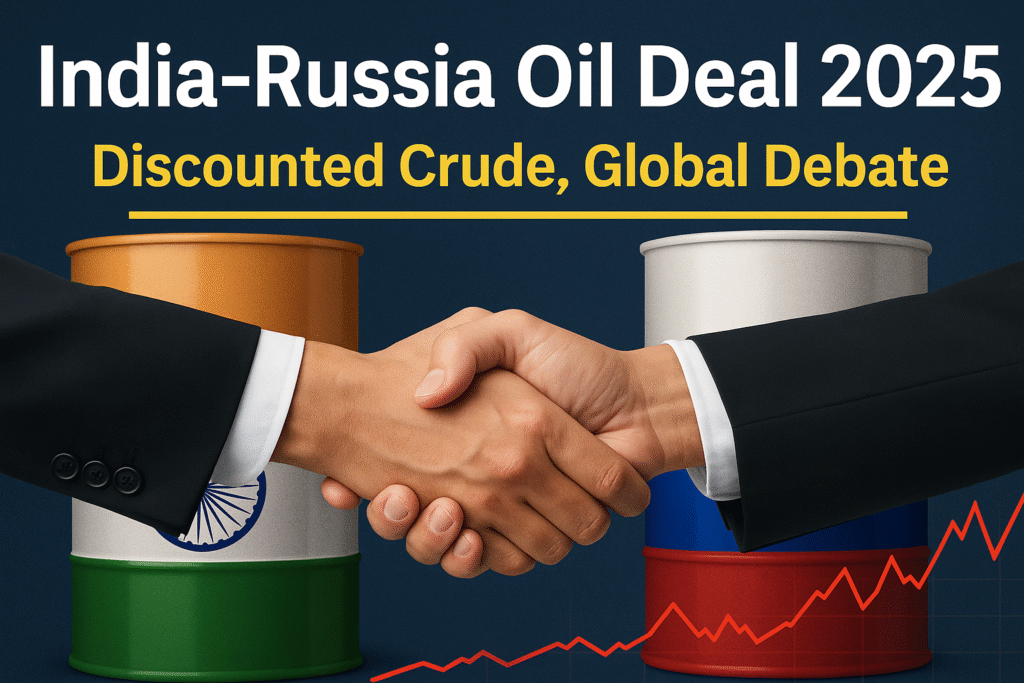India-Russia Oil Trade 2025: How Discounted Crude is Shaping Global Diplomacy
Why is India still buying Russian crude oil in 2025? What does it mean for energy prices and foreign policy? Let’s break down the real story behind India’s strategic oil deals with Russia — and how it’s impacting the world economy.
Background: The Growing India-Russia Oil Partnership
Since Western sanctions were imposed on Russia after the Ukraine crisis, India has taken advantage of steep discounts on Russian crude oil. This has significantly shifted global oil dynamics — with India emerging as a key buyer outside the Western bloc.
Key Factors Driving the Trade
- 30-35% cheaper crude compared to Brent and WTI
- Flexible payment terms (rupee-dirham or INR-based trade)
- Strategic diversification from traditional Middle East suppliers
India’s Economic Strategy Behind Buying Russian Oil
India, being the world’s third-largest oil importer, needs affordable energy to power its growing economy. With global prices rising, International Energy Agency reports confirm that India’s cost-saving measures via Russian crude have kept fuel inflation under control.
Benefits to Indian Economy:
- Lower fuel prices for consumers and industries
- Higher profit margins for Indian refiners
- Reduced dependency on volatile Gulf suppliers
- Boost to forex reserves through rupee-denominated trade
What’s the Concern? US Pressure & Tariff Tensions
In July 2025, India officially conveyed its concern to a visiting US Senator regarding proposed secondary tariffs or shipping sanctions on Russian oil. India argued that such restrictions hurt energy access for developing countries.

India’s Key Arguments to the US:
- “Energy security should not be politicized.”
- “Developing nations need affordable oil to sustain growth.”
- “Trade decisions are driven by national interest, not alignment.”
How This Impacts the Global Oil Market
The India-Russia oil relationship is not just bilateral — it’s reshaping the global energy map. European buyers now compete with India for refined oil, as Indian refineries re-export processed Russian crude at a profit.
Ripple Effects:
- India becomes a key global re-export hub for diesel and jet fuel
- Russia diversifies away from Europe toward Asia
- OPEC+ members lose some pricing power
To learn how India is managing global diplomacy while securing energy independence, check out our full trade and economy coverage.
Challenges Ahead in 2025,India-Russia Oil Trade
While India has handled the geopolitical balancing act well so far, risks remain:
- New US or EU sanctions could affect shipping insurance
- Payment settlement complexities may arise with global SWIFT restrictions
- Risk of overdependence on Russian supply chain
Conclusion: Realpolitik in Energy Matters
India’s decision to buy Russian oil isn’t just economic — it’s strategic. In a world fragmented by sanctions and blocs, India is choosing pragmatism. It’s not about picking sides — it’s about picking the best deal for 1.4 billion people.
💬 What’s Your Take?
Should India continue importing Russian oil despite Western pressure? What would you do if you were the decision-maker? Share your thoughts in the comments!
👉 For more updates on India’s foreign trade, energy deals, and strategic policies, explore our full coverage at SVLinker.

